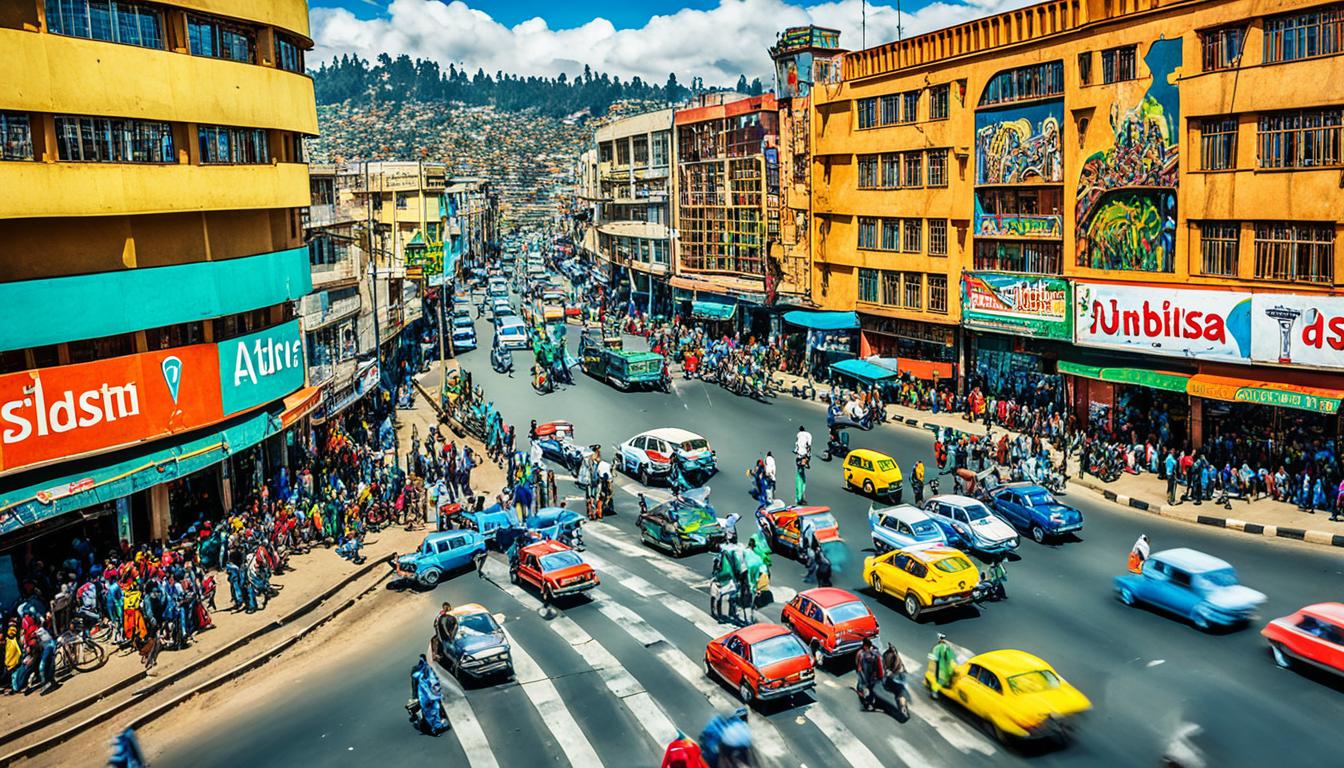How Dangerous Is Addis Ababa?
When it comes to traveling to unfamiliar places, safety is always a top concern. But how dangerous is Addis Ababa, the capital city of Ethiopia? Are there safety risks that we need to be aware of while navigating through this vibrant city? Let’s explore the facts and find out if a secure visit to Addis Ababa is possible.
Key Takeaways:
- Addis Ababa, the capital city of Ethiopia, is generally considered to have a stable security situation.
- However, there are several high-risk areas in Ethiopia that should be avoided due to sporadic violent conflict, civil unrest, crime, terrorism, kidnapping, and ethnically motivated violence.
- By taking necessary precautions and staying updated on the current security situation, you can navigate the risks and have a secure visit to Addis Ababa and Ethiopia.
Safety and Security in Addis Ababa
Addis Ababa, the capital city of Ethiopia, is known for its overall stable security situation. However, it’s important to note that there have been sporadic incidents of violent conflict and civil unrest in other areas of the country. While Addis Ababa is considered relatively safe, it’s crucial to stay informed and take precautions to ensure your personal safety.
The security situation in Ethiopia can change without warning, and the U.S. Embassy may not be able to assist with departure during such situations. Additionally, U.S. officials have limited access to U.S. citizens detained by Ethiopian authorities. To mitigate any potential risks, it is recommended that you monitor local media for breaking events, remain aware of your surroundings, and exercise caution in locations frequented by foreigners.
Remember to:
- Carry a copy of your passport and visa with you at all times.
- Have evacuation plans in place that do not rely on U.S. government assistance.
High-Risk Areas in Ethiopia

When traveling to Ethiopia, it is important to be aware of the high-risk areas that have travel restrictions in place for U.S. government personnel. These regions are affected by violent conflict, civil unrest, ethnically motivated violence, and other security concerns.
Tigray Region
The Tigray Region in Ethiopia is currently considered a high-risk area due to ongoing violent conflict and civil unrest. It is advised to avoid traveling to this region.
Afar-Tigray Border Area
The border area between Afar and Tigray is also classified as a high-risk area. Travel restrictions are in place due to the potential for violent conflict and security concerns.
Amhara Region
The Amhara Region of Ethiopia is another high-risk area with travel restrictions. It is important to avoid this region due to the potential for violence and civil unrest.
Gambella Region
The Gambella Region is affected by violent conflict and crime, making it a high-risk area. It is advised to steer clear of this region and prioritize your safety.
Benishangul Gumuz Region
The Benishangul Gumuz Region is also classified as a high-risk area due to security concerns and violent conflict. Travel to this region should be avoided.
Oromia Region
There are specific areas within the Oromia Region that have travel restrictions. These areas are affected by civil unrest and security issues. It is important to stay informed and avoid travel to these specified areas.
Southern Nations and National People (SNNP) Region
Similarly, there are specific areas within the Southern Nations and National People (SNNP) Region that have travel restrictions. It is advised to avoid these areas due to security concerns and the potential for violence.
Border Areas
The border areas of Ethiopia, including the borders with Somalia, Sudan, South Sudan, and Kenya, are high-risk areas. These regions are affected by various security issues, such as terrorism, crime, and ethnically motivated violence.
Traveling to these high-risk areas in Ethiopia should be avoided, as they pose significant dangers and may have limited access to consular services. It is important to prioritize your safety and adhere to any travel advisories or restrictions in place.
Travel Tips and Precautions

If you decide to travel to Addis Ababa or other parts of Ethiopia, there are several precautions you should take to ensure a safe and enjoyable trip.
Stay Informed and Aware
Monitor local media for any breaking events or security updates. Stay up-to-date with the current situation and be prepared to adjust your plans accordingly. It’s important to be aware of your surroundings at all times, especially in areas frequented by foreigners.
Secure Your Documents
Carry a copy of your passport and visa with you at all times. It’s advisable to leave the originals in a hotel safe or another secure location to avoid the risk of losing them. Having a copy will make it easier to replace them if needed.
Plan for Emergencies
Have evacuation plans in place that do not rely on U.S. government assistance. It’s crucial to be prepared for unexpected situations, such as natural disasters or civil unrest. Enroll in the Smart Traveler Enrollment Program (STEP) to receive alerts and make it easier for authorities to locate and assist you in case of an emergency.
Stay Updated
Follow the Department of State on social media for the latest updates and travel advisories. Review the country security report for Ethiopia to stay informed about potential risks and security measures. Having access to reliable information will help you make informed decisions and stay safe during your trip.
By following these travel tips and taking necessary precautions, you can have a safe and enjoyable visit to Addis Ababa and other parts of Ethiopia. Remember to always prioritize your safety and be prepared for any potential risks or emergencies.
Conclusion
When planning a trip to Addis Ababa, it’s crucial to consider the safety risks and take necessary precautions. While the city itself generally has a stable security situation, Ethiopia as a whole experiences sporadic violent conflict, civil unrest, and other security challenges in various regions. Therefore, it’s essential to stay informed about the current security situation through local media and official travel advisories.
To ensure a secure visit, it is advisable to avoid high-risk areas and be vigilant about personal safety. By monitoring your surroundings, carrying copies of important documents like your passport and visa, and having evacuation plans that don’t rely on U.S. government assistance, you can mitigate potential risks. Enrolling in the Smart Traveler Enrollment Program (STEP) and following the Department of State on social media can also help you stay updated and receive alerts in case of emergencies.
While it’s important to be cautious, don’t let safety concerns deter you from exploring the vibrant city of Addis Ababa and the fascinating country of Ethiopia. By taking the necessary precautions and being aware of potential risks, you can have a rewarding and secure visit to Addis Ababa.




